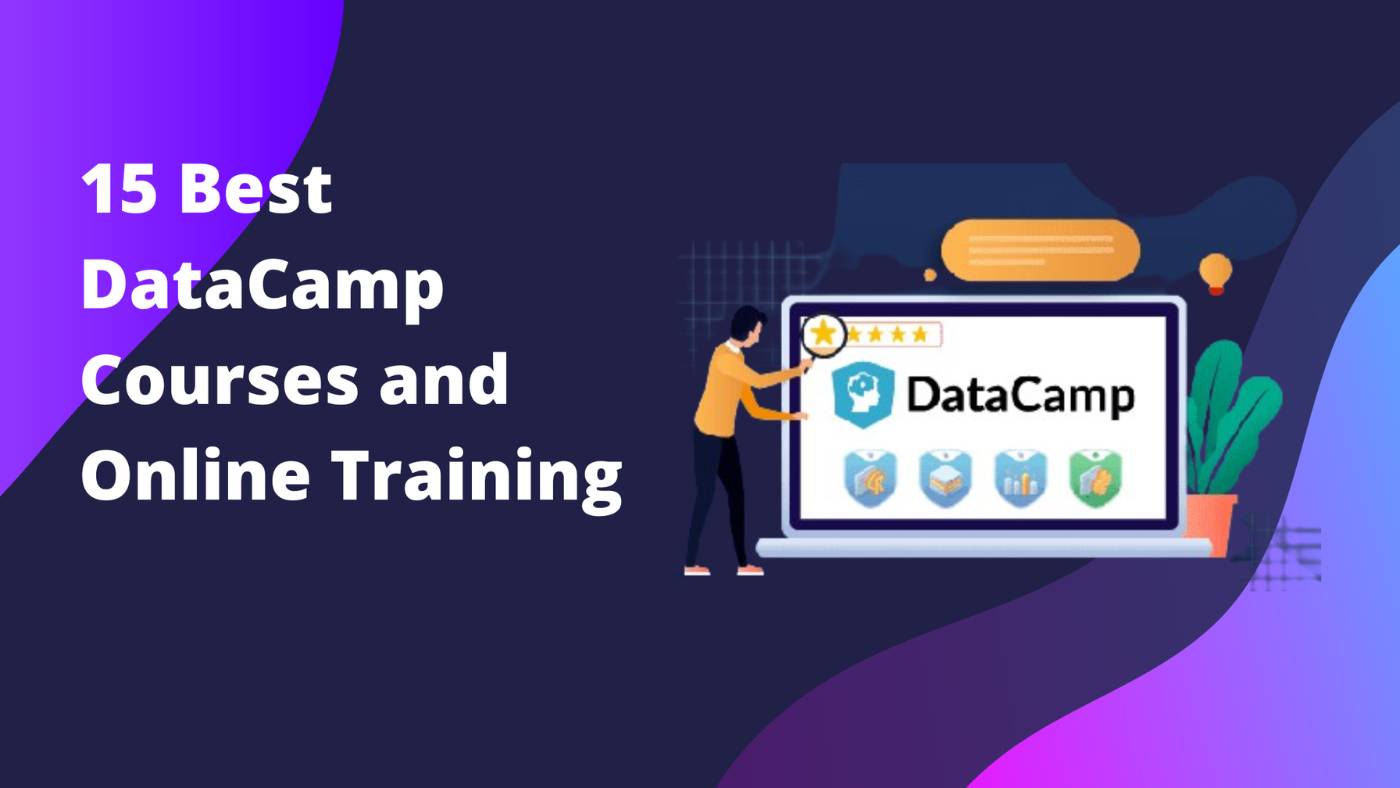In the dynamic world of data science and analytics, staying updated with the latest trends and skills is crucial. DataCamp, a leading online learning platform, offers a range of courses tailored to meet these evolving demands. In 2024, some courses will stand out for their comprehensive coverage, expert instruction, and practical applicability. This article delves into the 15 best DataCamp courses that are essential for anyone looking to excel in the field of data science.
What’s in this article?
- 1 What is DataCamp?
- 2 The 15 Best DataCamp Courses and Online Training for 2024
- 2.1 1. Introduction to R
- 2.2 2. Introduction to Python
- 2.3 3. Introduction to SQL
- 2.4 4. Introduction to Power BI
- 2.5 5. Introduction to Git
- 2.6 6. Introduction to Scala
- 2.7 7. Introduction to Statistics in Python
- 2.8 8. Introduction to the Tidyverse
- 2.9 9. Introduction to Data Visualization with Matplotlib
- 2.10 10. Data Analysis in Spreadsheets
- 2.11 11. Analyzing Data in Tableau
- 2.12 12. Data Processing in Shell
- 2.13 13. Data Analysis in Excel
- 2.14 14. Data Manipulation with Pandas
- 2.15 15. Intermediate Python for Finance
- 3 Bonus Tips:
- 4 Faqs: The 15 Best DataCamp Courses and Online Training for 2024
- 5 Conclusion: The 15 Best DataCamp Courses and Online Training for 2024
What is DataCamp?
DataCamp stands as a prominent and esteemed online platform specializing in the provision of comprehensive data science and analytics education. It distinguishes itself by offering a diverse array of meticulously crafted courses, tutorials, and interactive learning experiences, all meticulously designed to facilitate the acquisition and refinement of skills in data analysis, programming, machine learning, and associated disciplines.
Central to DataCamp courses reputation is its unwavering commitment to practical, hands-on learning. This focus renders the platform an exemplary choice for individuals endeavoring to initiate or advance their careers in the dynamic realm of data science.
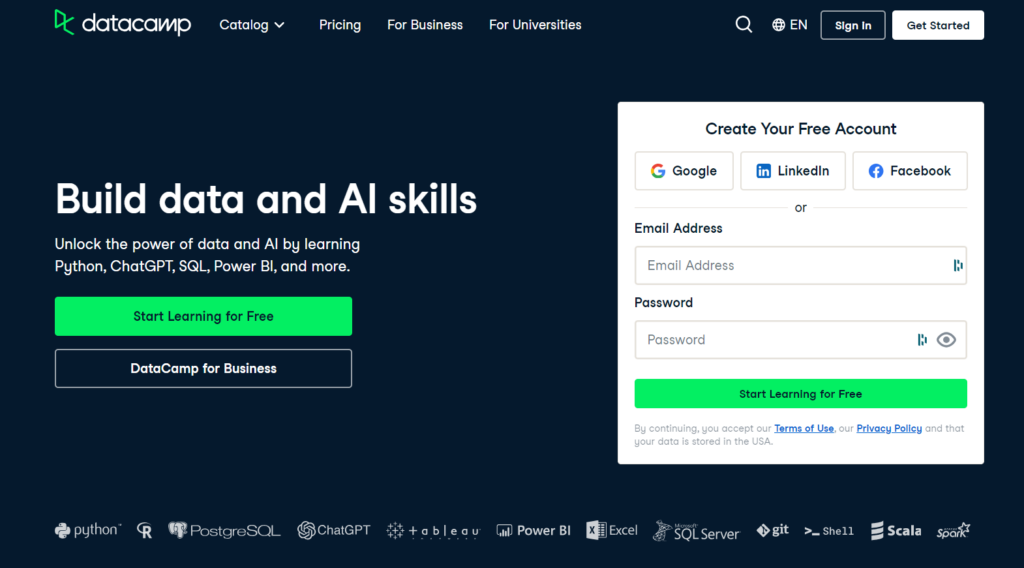
Key attributes of DataCamp:
1. Expansive Course Catalog: DataCamp’s repository encompasses an extensive spectrum of courses, encompassing programming languages, data manipulation techniques, statistical analysis, machine learning methodologies, data visualization, and more.
These offerings are thoughtfully tailored to cater to a diverse audience, ranging from novices taking their initial steps to seasoned professionals seeking to augment their expertise.
2. Interactive Pedagogy: Courses featured on DataCamp exhibit a high degree of interactivity. They amalgamate video-based instruction with hands-on coding exercises, quizzes, and substantial projects. This interactive approach empowers learners to actively apply their acquired knowledge within the platform’s dedicated coding environments.
3. Real-World Pertinence: DataCamp courses curriculum is meticulously designed to address authentic data analysis challenges. This ensures that learners cultivate skills that are not only theoretically robust but also immediately applicable in professional contexts.
4. Skill Tracks and Career Trajectories: The platform offers skill tracks and career paths that meticulously guide learners through a curated sequence of courses, strategically aimed at achieving specific career aspirations. Whether you are aspiring to become a data scientist, data analyst, or data engineer, DataCamp provides tailored roadmaps.
5. Up-to-date Content: DataCamp is resolute in its commitment to maintaining content currency. Courses are regularly updated to align with the latest trends and technologies within the content field of data science. Consequently, learners are equipped with the most current knowledge and skills.
6. Community and Collaborative Learning: DataCamp fosters a vibrant community of learners, offering opportunities for interaction, peer engagement, and knowledge sharing. Learners can seek assistance, collaborate with peers, and benefit from a supportive learning ecosystem.
7. Accessibility and Inclusivity: While DataCamp offers both free and paid subscription plans, it remains steadfast in its mission to extend quality data science education to a wide and diverse audience.
The 15 Best DataCamp Courses and Online Training for 2024
1. Introduction to R
“Introduction to R” is a flagship course by DataCamp, designed for beginners with little to no prior experience in programming. This course meticulously introduces the fundamentals of R programming, a language revered in the data science community for its robustness and applicability in statistical analysis.
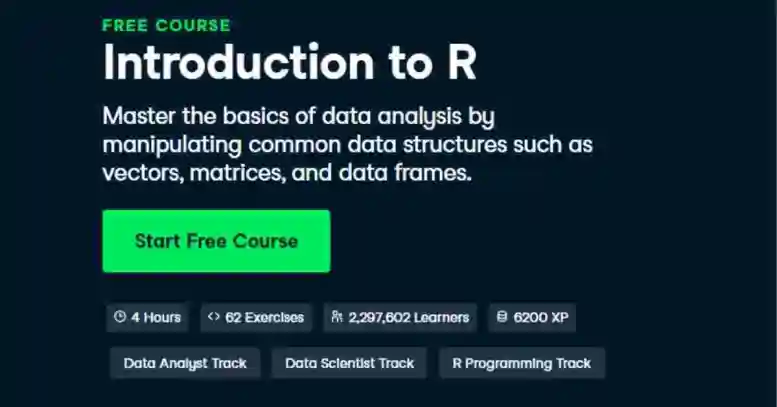
Through interactive exercises, learners are introduced to R’s unique syntax and basic programming concepts, including data types, vectors, and data frames. The course methodically progresses into more complex operations like data manipulation and visualization, providing a comprehensive foundation in R.
It’s an ideal starting point for aspiring data scientists and statisticians who prefer a language that’s tailor-made for statistical analysis and data visualization.
2. Introduction to Python
DataCamp courses, “Introduction to Python,” represents an exemplary entry point for individuals aspiring to delve into the realms of data science or commence their journey in fundamental programming.
This course meticulously dissects Python, acknowledged widely for its flexibility and prevalence in the contemporary programming landscape. Tailored for novices, the course begins with elementary aspects of Python such as variables, data types, and lists, progressively navigating towards more intricate structures, including functions and loops.
The curriculum underscores the practical implementation of Python, enabling participants to adeptly craft their own Python scripts and handle datasets from real-world scenarios.
Concluding this course, participants will have acquired a profound grasp of the foundational principles of Python, positioning them aptly for advanced exploration in data analysis, machine learning, or web development utilizing Python.
3. Introduction to SQL
SQL, the cornerstone of database management, is an essential skill for data analysts and scientists. DataCamp’s “Introduction to SQL” is crafted to turn beginners into proficient users of this powerful query language.
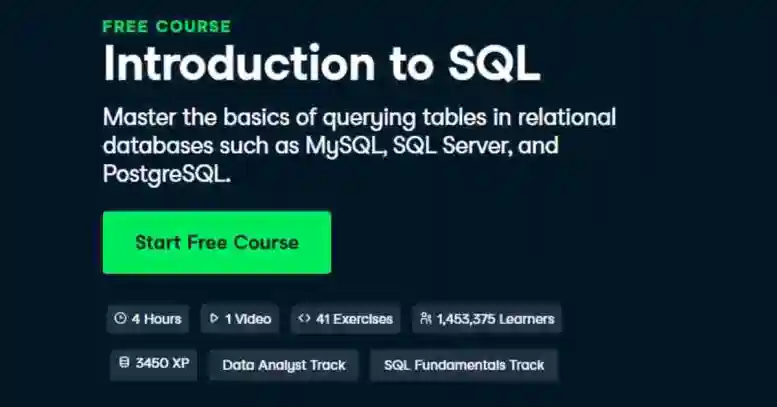
Throughout this course, participants will be led through the fundamentals of SQL, encompassing techniques for crafting queries to retrieve and modify data. The curriculum commences with foundational SELECT statements, progressively delving into intricate notions such as joins, aggregations, and subqueries.
The course also emphasizes practical scenarios, allowing students to work on real databases. By the end, students will be able to comfortably navigate and manage data within relational databases, a critical skill in the data-driven world.
Also Read : DataCamp vs. DataQuest: Which is better for data science?
4. Introduction to Power BI
“Mastering Data Visualization and Business Intelligence with ‘Introduction to Power BI’” is a specially curated course designed to equip individuals with the skills to excel in data visualization and business intelligence. At the forefront of driving business decision-making is Power BI, an interactive tool by Microsoft that empowers users with advanced data analysis and reporting capabilities.
The basics of Power BI, including data import and transformation Learners then progress to creating interactive dashboards and reports, a crucial skill for any data analyst or business intelligence professional.
The course emphasizes practical applications, offering insights into creating compelling visualizations that convey meaningful stories from data. By the end, students will be adept at utilizing Power BI to turn raw data into actionable insights.
5. Introduction to Git
In the realm of software development and data science, version control is indispensable. DataCamp courses “Introduction to Git” course provides a comprehensive overview of Git, the most widely used version control system.
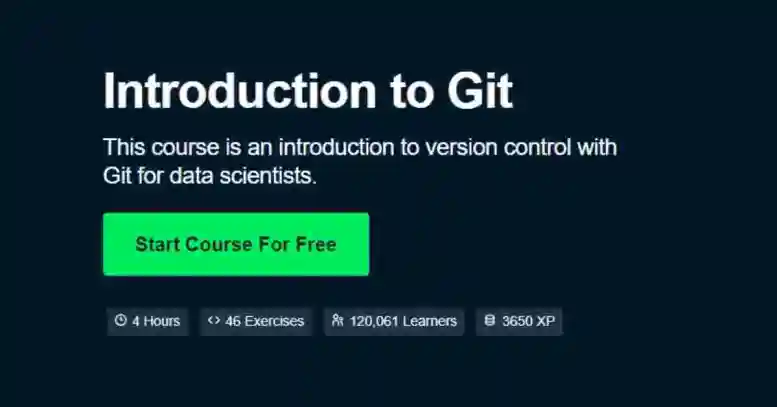
This is a journey through the fundamentals of Git, including repository creation, committing changes, and branching. By the end of the course, students will have acquired the skills to effectively monitor modifications, engage in teamwork, and sustain a seamless process in their endeavors.
This practical and interactive course guarantees that learners will have the confidence to utilize Git for overseeing versions in their development or data science ventures.
6. Introduction to Scala
“Introduction to Scala” is a specialized course for those interested in this powerful programming language, known for its functional programming capabilities and use in big data processing.
This course delves into Scala’s basics, starting with its syntax, control structures, and data types. It gradually introduces more advanced concepts like functional programming and collections.
Ideal for programmers seeking to broaden their expertise or individuals intrigued by big data applications, this course is tailored to those who wish to explore Scala, a language that seamlessly integrates object-oriented and functional programming paradigms.
With its ability to tackle intricate programming challenges, Scala presents a distinctive approach, particularly in the realm of big data.
7. Introduction to Statistics in Python
DataCamp courses “Introduction to Statistics in Python” is an essential course for anyone aiming to understand data analysis and interpretation. This course covers fundamental statistical concepts, including probability distributions, hypothesis testing, and regression analysis, all within the Python ecosystem.
It is particularly beneficial for those looking to apply statistical methods to data science projects. The course integrates Python’s powerful libraries, like NumPy and Pandas, making it a practical guide for performing statistical analysis on real data. By the end, learners will be equipped to conduct rigorous statistical analysis and draw meaningful conclusions from data sets.
8. Introduction to the Tidyverse
The “Introduction to the Tidyverse” course is a deep dive into one of R’s most powerful collections of data science tools. Learners explore the Tidyverse, a suite of R packages designed for data science.
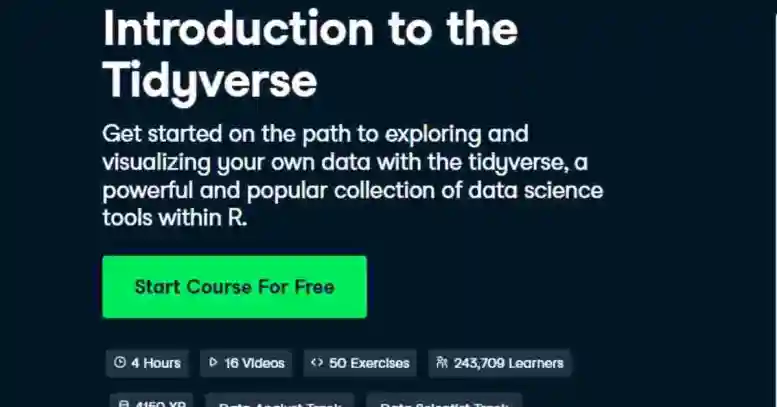
The course covers data manipulation with dplyr, data visualization with ggplot2, and data tidying with tidy. These tools are fundamental for anyone working with data in R, offering a coherent and fluent workflow for data analysis.
The course is highly interactive, allowing learners to apply these tools to real datasets, thus gaining practical experience in data wrangling and visualization.
9. Introduction to Data Visualization with Matplotlib
DataCamp courses “Introduction to Data Visualization with Matplotlib” course is a must for aspiring data scientists and analysts. This course focuses on Matplotlib, Python’s primary library for static, animated, and interactive visualizations.
Starting with basic plots and charts, the course moves into more complex visualizations, teaching students how to create and customize plots effectively to interpret data insights visually.
This course is essential for those looking to communicate data findings or those interested in the visual aspect of data analysis.
10. Data Analysis in Spreadsheets
This course is pivotal for professionals seeking to utilize spreadsheets for advanced data analysis. It delves into the sophisticated features of spreadsheet software, equipping participants with skills to effectively manipulate, analyze, and visualize data.
Particularly beneficial for those who regularly use spreadsheets for data organization, the course enhances proficiency in complex functionalities such as sorting, filtering, and applying advanced functions.
Participants will emerge as adept users capable of extracting significant insights from large datasets. Additionally, the course addresses data validation and automation techniques, offering valuable skills for streamlining data processing workflows.
11. Analyzing Data in Tableau
“Analyzing Data in Tableau” is tailored for individuals aspiring to excel in data visualization using Tableau, a leading tool in the industry. The course guides participants through creating interactive visualizations and dashboards, teaching effective utilization of Tableau’s functionalities.
It covers connecting to various data sources, employing Tableau’s interface for insight communication, and tackling advanced topics such as integrating Tableau with programming languages like R and Python.
Appropriate for both beginners and seasoned professionals, this course enhances participants’ abilities to transform complex datasets into clear, impactful visual narratives.
12. Data Processing in Shell
“Data Processing in Shell” introduces the potent capabilities of command-line tools for data processing, targeting data professionals seeking to augment their technical acumen.
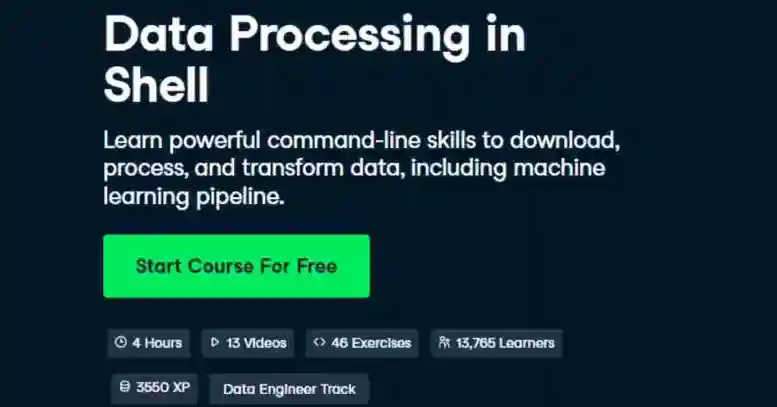
The course covers efficient navigation, manipulation, and analysis of data within the shell environment. In order to significantly increase productivity and data handling proficiency, participants will learn essential commands, scripting techniques, and automation strategies.
13. Data Analysis in Excel
The goal of this extensive course, “Data Analysis in Excel,” is to help professionals get the most out of Microsoft Excel’s data analysis features.
The course explores a variety of features, including functions, formulas, pivot tables, and data visualization tools, ranging from basic data entry techniques to advanced analysis methodologies using Excel’s robust functionalities.
Additionally, it ventures into sophisticated areas like statistical analysis using Excel and integration with other data analysis platforms. Suitable for both novice and veteran Excel users, this course significantly bolsters the capacity to analyze and interpret data, thus enhancing professional efficiency and effectiveness.
14. Data Manipulation with Pandas
The “Data Manipulation with Pandas” course is indispensable for individuals engaged in Python-based data analysis. Pandas, a powerful Python library, is the focus of this comprehensive course, which imparts skills for efficient cleaning, transformation, and aggregation of data.
Covering crucial aspects like data frame manipulation, handling missing data, and dataset merging, the course also introduces advanced techniques such as time series analysis and managing large datasets.
Upon completion, participants will possess the requisite skills to confidently manipulate and prepare data for in-depth analysis, thereby enhancing their proficiency as data scientists or analysts.
15. Intermediate Python for Finance
Targeted at finance professionals seeking to incorporate Python in financial analysis, “Intermediate Python for Finance” builds upon basic Python skills, introducing tools and libraries specific to finance.
The course covers analyzing financial data, conducting portfolio analysis, and applying Python to risk management and algorithmic trading. Merging theoretical knowledge with practical case studies ensures participants gain hands-on experience in applying Python to real-world financial challenges. This course serves as an invaluable asset for financial analysts, investment managers, and those eager to integrate Python into their financial skill set.
Also Read : DataCamp vs. DataQuest: Which is better for data science?
Bonus Tips:
1. Analyzing Marketing Campaigns with Pandas
“Analyzing Marketing Campaigns with Pandas” is a specialized course crafted for marketing professionals and data analysts. It focuses on utilizing the Pandas library in Python for dissecting and extracting insights from marketing data.
The course spans a variety of subjects, from evaluating the efficacy of marketing campaigns to strategies for customer segmentation and targeting. Participants will engage with authentic marketing datasets, learning techniques for data cleansing, manipulation, and visualization to inform marketing decisions.
The culmination of this course equips participants with the ability to derive actionable insights from marketing data, thereby enhancing their strategic decision-making capabilities.
2. Cleaning Data in Python
“Cleaning Data in Python” is a crucial course for all data practitioners. It addresses the fundamental aspect of data science: the preparation of raw data for analysis. The course offers a range of techniques to tackle issues like missing values, duplicate data, inconsistencies, and data type transformations.
Utilizing practical, hands-on methods with real datasets, it highlights common data cleaning challenges and their solutions. Mastery of these skills ensures the reliability and accuracy of data analyses, a critical factor in deriving valid conclusions.
3. Understanding Data Engineering
“Understanding Data Engineering” provides a thorough overview of data engineering, a key component in the data science framework. The course encompasses fundamental aspects of data engineering, including infrastructure, storage, and pipeline design. Participants will explore big data technologies, cloud computing, and ETL processes.
Tailored for those aspiring to comprehend the intricacies of data management and preparation, this course is an excellent resource for prospective data engineers and data scientists keen on deepening their engagement with large-scale data.
Faqs: The 15 Best DataCamp Courses and Online Training for 2024
How do I choose the best DataCamp courses?
Choosing the best DataCamp courses depends on your current skill level, professional goals, and areas of interest. Beginners may start with foundational courses in Python or R, while those with some experience might opt for courses in machine learning or data visualization.
Can I access DataCamp courses for free?
DataCamp offers some introductory courses and materials for free. However, to access the full range of courses and paths, a subscription is typically required. They occasionally offer trials or special promotions that provide broader access for a limited time.
Are there any advanced DataCamp courses available?
Yes, DataCamp offers advanced courses in areas like deep learning, advanced statistical methods, and complex data engineering. These courses are suitable for learners who already have a solid foundation in the basics of data science and programming.
Can I access DataCamp courses offline?
DataCamp primarily offers online courses, and offline access may be limited. However, for subscribers, some features, like mobile downloads for on-the-go learning, might be available.
Conclusion: The 15 Best DataCamp Courses and Online Training for 2024
In conclusion, DataCamp courses meticulously curated selection of courses for the year 2024 represents an indispensable resource for individuals aspiring to excel in the domains of data science and analytics. The breadth of these courses spans from foundational programming languages such as Python and R to the intricacies of advanced topics including machine learning, data engineering, and cloud computing.
The versatility of DataCamp’s educational offerings ensures that both neophytes and seasoned professionals can discover courses tailored precisely to their requirements and career ambitions. Whether one seeks to establish a robust foundational understanding or delve into the forefront of data science methodologies, DataCamp courses are meticulously structured to facilitate skill development and knowledge acquisition.

